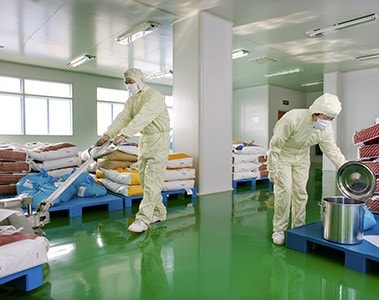
Improving our resource efficiency
By using resources more efficiently and replacing fossil-based materials with more renewable ones we are demonstrating that it’s possible to build a more circular world.
At DSM we’re dedicated to securing the future availability of natural resources and unlocking more value from the limited resources we have. In fact, we strive to help society transform to a circular, bio-based economy that mirrors the workings of mother nature herself in many ways. It provides food, materials and energy in a way that is cyclical and restorative by design – very much the opposite of our current linear economy where so much is wasted…
Creating a brighter world for all means thinking differently. Recycling materials and recovering energy are excellent ways to reduce waste and pollution and slow down climate change. However, a circular economy goes beyond looking at waste: it is about sourcing renewable materials; improving durability or shelf-life of products, and creating more value from waste streams.
By using resources more efficiently and replacing fossil-based materials with more renewable ones we are demonstrating that it’s possible to build a more circular world. We approach resource efficiency on two fronts; renewable sourcing and continously improving our day-to-day operations.
We strive to reduce finite resources and replace them with renewable ones; to reduce waste through more efficient production and recycling; and to reduce the use of hazardous chemicals by shifting to safe alternatives within DSM and across our value chains with customers, suppliers and end-consumers.
We work with all kinds of organizations - from governments and NGOs to academia and other private companies - to shape and influence the circular economy agenda.
Champions 12.3 is a coalition of executives dedicated to achieving Sustainable Development Goal 12.3: halving per capita global food waste and reducing food losses along production and supply chains by 2030. We play our part here through our family of food ingredients and solutions, while also looking to address food loss and waste in other areas.
Circle Economy is dedicated to accelerating the transition towards a Circular Economy through various programs and tools. As a member of the Circle Built Environment Programme, DSM is exploring how to provide new material solutions for the buildings & construction industry based on circularity principles.
The World Business Council for Sustainable Development (WBCSD) is a CEO-led organization of over 200 businesses working towards joint sustainability goals. As co-chair of the WBCSD’s circular economy program, Factor 10, DSM is teaming up with fellow members to scale up circularity-based solutions in the automotive and built environment sectors, as well as tackling food loss and waste.

By using resources more efficiently and replacing fossil-based materials with more renewable ones we are demonstrating that it’s possible to build a more circular world.

Reduce, Replace, Extend, Enable & Recover. How we are safeguarding current and future natural resources and unlocking more value from those we use.

DSM takes its global environmental and social responsibilities seriously. This goes beyond our own operations to that of our suppliers, customers, and end-users.